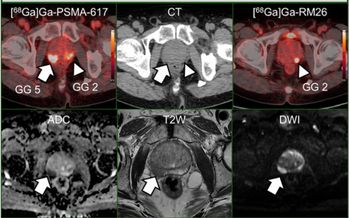
PET/MRI Better Than PET/CT for Foot Pain
Imaging with 18F-fluoride PET/MR provide clearer images for patients with unclear foot pain.
Imaging with 18F-fluoride PET/MR for patients with foot pain of unclear cause is technically feasible and provides better image quality than 18F-fluoride PET/CT, according to a study published in
Researchers from Germany sought to compare the two imaging techniques for quality and diagnostic performance. Their study comprised nine men and 13 women, mean age 48, who had complaints of foot pain without clear cause and who had undergone single-injection dual-imaging protocol with 18F-fluoride PET/CT and PET/MR.
The researchers compared the results of the images, which showed that image quality was significantly superior for PET/MR, and the sensitivity of the PET datasets in PET/MR and PET/CT was equivalent, with the same 42 lesions showing focal 18F-fluoride uptake.
The most common diagnoses were osteoarthritis, stress fracture, and bone marrow edema, the authors wrote.
"In our study, 18F-fluoride PET/MR provided more diagnostic information at a higher diagnostic certainty compared to 18F-fluoride PET/CT in patients with foot pain of unclear cause," coauthor Isabel Rauscher, said in a release. "Besides information on bone metabolism, it provides additional diagnostic relevant findings from soft-tissue and bone marrow pathology (eg, bone marrow edema, ganglion cysts, or tenosynovitis) compared to PET/CT."
The researchers also pointed out that patient radiation exposure was lower when using the PET combination.
Newsletter
Stay at the forefront of radiology with the Diagnostic Imaging newsletter, delivering the latest news, clinical insights, and imaging advancements for today’s radiologists.














